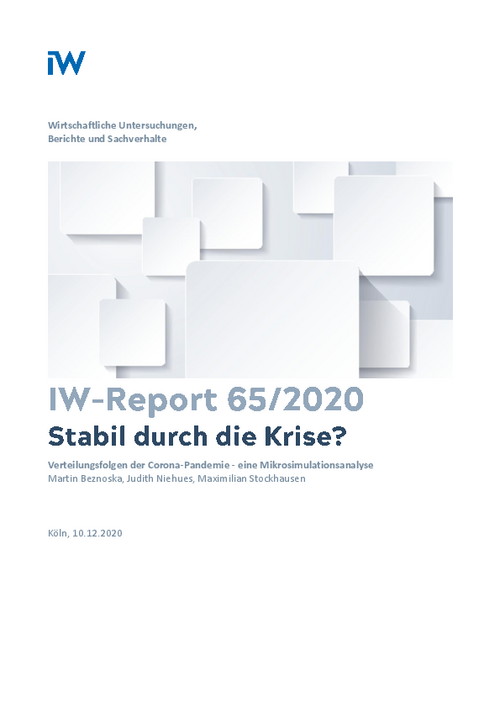The corona pandemic has had a decisive impact on the year 2020 and, at least in recent times, has had an unprecedented (negative) impact on society and the economy. At the core of this simulation study is therefore the question of how the corona pandemic has affected income levels and social inequality in Germany, and to what extent automatic stabilizers of the social security system and additional financial aid measures have been able to cushion distortions caused by the crisis.

Stable Through the Crisis?: Distributional Consequences of the Corona Pandemic - A Microsimulation Analysis
IW-Report

The corona pandemic has had a decisive impact on the year 2020 and, at least in recent times, has had an unprecedented (negative) impact on society and the economy. At the core of this simulation study is therefore the question of how the corona pandemic has affected income levels and social inequality in Germany, and to what extent automatic stabilizers of the social security system and additional financial aid measures have been able to cushion distortions caused by the crisis.
To this end, household survey data from the Socio-Economic Panel (SOEP) from 2018, which have been updated to the current year, will be combined with survey data from the IW on the financial consequences and subjective assessments of the corona crisis from August 2020 using a statistical matching procedure. With the help of the microsimulation model IW-STATS, household taxes and social contributions to be paid and public transfers received are simulated on the basis of the resulting changes in income and in status during the corona crisis. In addition, the equivalence-weighted net household incomes are used as a basis for the analysis of the distributional effects, since the IW survey shows that the distribution of losses in individual labour incomes is already considerably moderated when the household context is taken into account. Changes in short-time work benefits (Kurzarbeitergeld), the one-time child bonus (Kinderbonus) and other financial crisis assistance are considered as precisely as possible.
In a first step, it can be shown that the market incomes of large parts of the population have been significantly reduced in the crisis year, with low-income earners and the self-employed being particularly hard hit. In a second step, the stabilizing effect of the welfare state's social security system can be seen, which have contributed significantly to the fact that the changes in disposable household incomes have been significantly smaller. This effect is particularly pronounced in the lower half of the income distribution. The simulation analysis shows that inequality in market incomes has been increasing during the crisis, but not inequality in disposable household incomes. At the same time, the comparison between 2019 and 2020 - when the same crisis-related income losses are modelled for both years, but only in 2020 the financial aid measures - shows that the measures taken, including reforms of the child benefit supplement (Kinderzuschlag) and the housing allowance (Wohngeld), have effectively counteracted an increase in social inequality in the crisis year. However, the long-term consequences of the corona pandemic on the distribution of income before and after taxes and transfers are not clear so far. However, the evaluation of the distributional effects known up to the time of the analysis suggests that the social security system - with its existing elements and the courageous intervention of policymakers - was able to cushion a substantial portion of the loss of income.

Martin Beznoska / Judith Niehues / Maximilian Stockhausen: Stabil durch die Krise? Verteilungsfolgen der Corona-Pandemie – eine Mikrosimulationsanalyse
IW-Report

Michael Hüther: Stabil durch die Krise? Verteilungsfolgen der Corona-Pandemie
Statement
Stabil durch die Krise? Verteilungsfolgen der Corona-Pandemie
Materialien
More on the topic

A Macroeconomic Analysis of Wage-Price Spirals
The subject of this Analysis is the forms that wage-price spirals can take and how they influence macroeconomic stability and inflationary trends in Germany.
IW
IW Distribution Report 2023: Attitudes towards social mobility
Fundamentally linked to the social market economy is the idea that everyone has the opportunity for social advancement, regardless of their social background, and that children should be better off than their parents.
IW